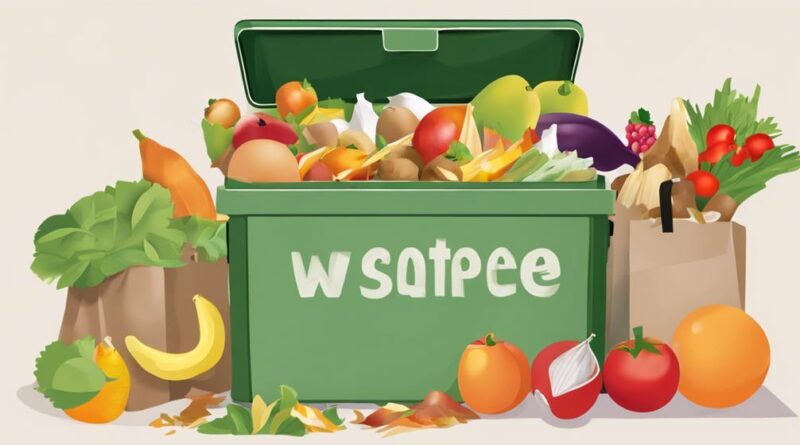How Natural Foods Contribute to Waste Reduction
By choosing natural foods, you actively help reduce waste. Sustainable farming practices in natural food production cut down on chemical use, packaging waste, and overflowing landfills. Organic farming methods emphasize soil health, crop diversity, and minimal chemical inputs. Opting for natural foods minimizes environmental impact and supports a healthier planet. Your choice in natural foods makes a significant impact on waste reduction and promotes a more sustainable food system. Further details on the benefits and practices await your discovery beyond this summary.
Benefits of Organic Farming
Embracing organic farming practices not only promotes sustainability but also fosters a healthier environment for future generations. Organic farming focuses on enhancing soil health through the use of natural fertilizers like compost and manure, which help maintain the soil's fertility and structure. By avoiding synthetic pesticides and chemicals, organic farmers create a balanced ecosystem where beneficial microorganisms thrive, further improving soil health.
One of the key advantages of organic farming is its emphasis on crop diversity. Instead of relying on monoculture, where a single crop is grown in large quantities, organic farmers cultivate a variety of crops. This practice not only reduces the risk of crop failure due to pests or diseases but also improves soil quality by preventing nutrient depletion. Crop rotation, a common technique in organic farming, involves planting different crops in a specific sequence to enhance soil fertility, control pests, and manage weeds naturally.
The combination of soil health and crop diversity in organic farming results in numerous benefits. Healthy soil acts as a natural carbon sink, helping to mitigate climate change by sequestering carbon dioxide from the atmosphere. Furthermore, diverse crops attract a wide range of beneficial insects, reducing the need for harmful pesticides. By supporting organic farming practices, you contribute to a sustainable food system that prioritizes environmental health and fosters resilience in agriculture for future generations.
Reducing Food Packaging Waste
In today's food industry, one pressing issue that requires urgent attention is the reduction of food packaging waste. The excessive use of packaging materials contributes significantly to environmental pollution, and it's imperative to adopt sustainable packaging solutions and eco-friendly alternatives.
To address this challenge, consumers can embrace zero waste shopping practices and opt for package-free options. By choosing products with minimal or biodegradable packaging, you can actively contribute to reducing the amount of waste generated from food packaging. Additionally, supporting brands that prioritize sustainable packaging can drive industry-wide change towards more environmentally friendly practices.
Some sustainable packaging solutions include using materials like compostable plastics, recycled paper, or reusable containers. These options not only reduce waste but also minimize the carbon footprint associated with traditional packaging materials. By making conscious choices when shopping for groceries and other food items, you're taking a step towards a more sustainable future.
Furthermore, advocating for policies that promote eco-friendly packaging standards can encourage businesses to invest in innovative packaging solutions that prioritize environmental conservation. Together, by embracing package-free alternatives and supporting sustainable packaging initiatives, we can make a significant impact in reducing food packaging waste and fostering a more sustainable food industry.
Minimizing Chemical Waste
To achieve a more sustainable food industry, reducing chemical waste is a crucial step that demands immediate attention and active participation. By implementing eco-friendly practices and green initiatives, the food industry can minimize its environmental impact and contribute to a healthier planet. Chemical waste from food production, processing, and packaging poses serious risks to both human health and the environment. Therefore, it's essential to prioritize the reduction of chemical waste through responsible and sustainable practices.
One effective way to minimize chemical waste is by adopting eco-friendly practices in food production. This includes using organic farming methods, reducing the use of synthetic pesticides and fertilizers, and implementing integrated pest management techniques. By choosing natural alternatives and sustainable farming practices, the food industry can significantly decrease the amount of chemical waste generated during the production process.
Green initiatives such as investing in renewable energy sources, implementing water conservation measures, and reducing the use of harmful chemicals in food processing can also help in minimizing chemical waste. By prioritizing sustainability and environmental responsibility, food companies can make a positive impact on the planet while ensuring the safety and well-being of consumers. It's crucial for all stakeholders in the food industry to work together towards a common goal of reducing chemical waste and promoting a more sustainable future for generations to come.
Utilizing Food Waste for Compost
Maximizing the potential of food waste by converting it into compost is a practical and environmentally responsible approach that benefits both the planet and your garden. By utilizing food waste for compost, you not only reduce the amount of waste that ends up in landfills but also create a nutrient-rich soil amendment that can significantly benefit your plants.
Compost benefits are numerous and impactful. When food waste is composted, it breaks down into a rich organic material that improves soil structure, enhances nutrient content, retains moisture, and promotes healthy microbial activity. This results in healthier plants with increased resistance to pests and diseases. Additionally, composting food waste reduces the need for chemical fertilizers, thereby decreasing the risk of water pollution and promoting sustainable gardening practices.
Moreover, waste reduction impacts are substantial when food waste is diverted to compost bins instead of landfills. Organic matter in landfills produces methane, a potent greenhouse gas that contributes to climate change. By composting food waste, you help mitigate these harmful emissions and reduce the overall carbon footprint associated with waste disposal. This simple act not only benefits your garden but also plays a crucial role in environmental conservation and sustainable waste management practices.
Impact on Landfill Reduction
By consistently diverting food waste to compost bins, you make a significant impact on reducing the amount of organic matter in landfills. Waste diversion plays a crucial role in landfill management by decreasing the volume of food scraps that end up in these sites. When organic waste decomposes in landfills, it generates methane, a potent greenhouse gas that contributes to climate change. By diverting food waste to compost, you actively participate in reducing the environmental impact of organic matter decomposition in landfills.
Landfill management is a critical aspect of waste reduction, and your contribution to diverting food waste is a proactive step towards a more sustainable future. Every apple core, banana peel, or carrot top that you compost instead of throwing in the trash makes a difference. Small actions like these collectively lead to significant reductions in the amount of organic waste that occupies precious space in landfills.
Your commitment to waste diversion not only helps in reducing the volume of organic matter in landfills but also contributes to minimizing greenhouse gas emissions. Through conscious choices in managing food waste, you actively participate in waste reduction efforts that have positive impacts on the environment. Keep up the good work in diverting food waste to compost bins to play your part in landfill reduction and overall environmental preservation.
Sustainable Food Practices
Making sustainable choices in your food practices not only benefits the environment but also contributes to a healthier and more ethical way of living. When it comes to sustainable food practices, there are several key aspects to consider:
- Ethical Sourcing: Choosing food products that are sourced ethically ensures that farmers and producers are treated fairly and that the products are made under humane conditions.
- Environmental Impact: Opting for foods with a lower environmental impact, such as those produced using organic farming methods or with minimal packaging, helps reduce your carbon footprint.
- Supporting Local Farmers: Buying from local farmers not only supports the local economy but also reduces the carbon emissions associated with transporting food long distances.
- Community Support: Engaging with local food initiatives and farmer's markets helps build a sense of community and strengthens the local food system.
- Reducing Food Waste: Implementing practices to reduce food waste, such as meal planning, proper storage, and composting, can significantly lower your environmental impact.
Supporting Local Food Systems

Supporting local food systems fosters community resilience, sustainability, and economic vitality. By engaging with local agriculture, you directly contribute to the well-being of your community. When you choose to buy from local farmers and producers, you aren't only supporting their livelihoods but also investing in the local economy. The money stays within the community, creating a cycle of support that benefits everyone involved.
Community support is at the core of local food systems. When you purchase from local sources, you establish a direct connection with the people who grow or make your food. This transparency allows you to know exactly where your food comes from, how it's produced, and the values behind its production. Such knowledge fosters trust and a sense of belonging within the community.
Moreover, local agriculture plays a crucial role in sustainability. By reducing the distance your food travels to reach your plate, you help lower carbon emissions associated with transportation. Additionally, local farmers often employ more sustainable practices that prioritize the health of the land and the surrounding ecosystem. This focus on sustainability ensures that future generations will have access to fertile soil and clean water.
Role in Circular Economy
Engaging with local food systems plays a vital role in creating a sustainable and efficient circular economy that minimizes waste and maximizes resource utilization. When considering the impact of natural foods on waste reduction within a circular economy, several key aspects come into play:
- Closed-Loop Systems: Natural foods support the concept of closed-loop systems where organic waste can be recycled back into the ecosystem through composting, thus reducing the amount of waste sent to landfills.
- Resource Efficiency: By sourcing locally grown natural foods, you support a more efficient use of resources, such as water and energy, as the supply chain is shortened, reducing transportation emissions and associated waste.
- Circular Supply Chains: Embracing natural foods encourages the development of circular supply chains that prioritize reducing, reusing, and recycling materials, fostering a more sustainable approach to waste management.
- Food Waste Reduction: Through promoting natural foods, you contribute to minimizing food waste at all stages of the supply chain, from production to consumption, aligning with the principles of a circular economy.
- Community Resilience: By engaging with local food systems and natural foods, you help build resilient communities that are less dependent on external resources, fostering a more sustainable and waste-conscious society.
Conclusion
By choosing natural foods, you aren't only nourishing your body but also contributing to waste reduction.
Organic farming, minimal packaging, and composting food waste all play a crucial role in creating a more sustainable food system.
Supporting local food systems and embracing a circular economy mindset are key steps in reducing our environmental impact.
Every small choice you make can have a big impact on the planet.
Let's continue to make sustainable choices for a healthier world.
